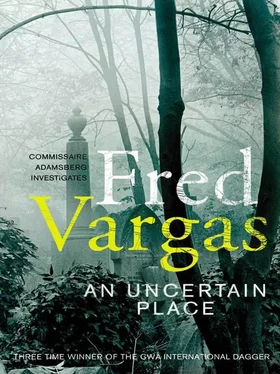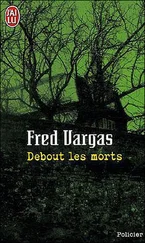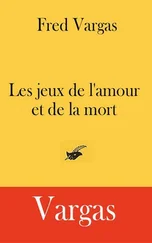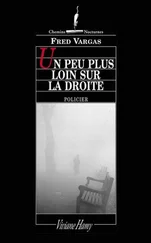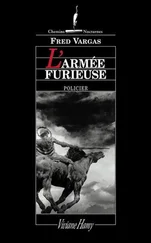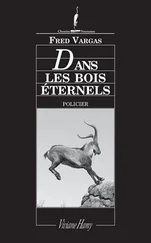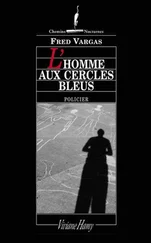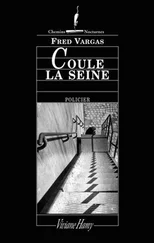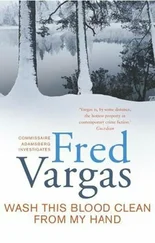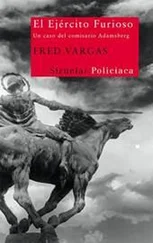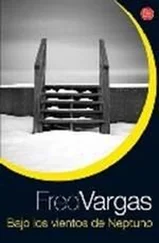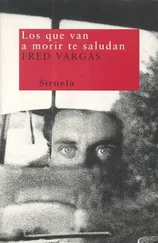Slavko had described village life to him in every season. It was a place full of folklore, fairies and demons: his uncle was favoured by the former and fought the latter. There was one great demon, who hid deep in the earth but who prowled around the edge of the wood, he would say, dropping his voice and putting his finger to his lips. Danglard’s mother had disapproved of Slavko’s stories and his father had scoffed, ‘Why’re you telling the kid all this stuff? He won’t sleep of nights!’ ‘Just my nonsense,’ Slavko would say, ‘the kid and me, we’re having fun.’
And then his aunt had left Slavko for some cretin called Roger. Slavko had gone back home.
Back over there.
To Kiseljevo.
Danglard gasped, poured himself a glass and dialled Adamsberg’s number. The commissaire picked up the phone at once.
‘So it doesn’t mean “kiss lover”, eh?’
‘No, it means Kiseljevo, which is the name of my uncle’s village.’
Adamsberg frowned and pushed a log with his foot.
‘Kiseljevo? That doesn’t sound the same as Estalère pronounced it. He said “kiss lover”.’
‘It is the same. In the west, Kiseljevo is called Kisilova. Like Beograd is called Belgrade.’
Adamsberg took his finger out of his other ear.
‘Kisilova,’ he repeated. ‘That is extraordinary, Danglard. There’s a chain running from Highgate to Garches, through the tunnel, the dark tunnel.’
‘No,’ said Danglard, who was putting up a frantic final defence. ‘Over there, lots of names start with K. And there’s another obstacle, don’t you see?’
‘I can’t see anything, I’ve got this tinnitus.’
‘I’ll speak louder. The obstacle is that it would be a truly massive coincidence if there was any link between my uncle’s shoes and the bloodbath in Garches. Something linking both of us, you and me, in two different cases. And you know what I think about coincidences.’
‘Exactly. So it means we have been gently led by the hand to that pile of shoes in Higg-gate.’
‘Who by?’
‘By Lord Fox, perhaps. Or more likely by his Cuban friend who disappeared so fast. He knew Stock would be along, and that we would be with him.’
‘And pray why would we have been gently led there?’
‘Because Garches, being such a catastrophic case, was certain to be sent to us. The killer knew that, and even if he was passing on to some new stage by getting rid of his collection – perhaps it had got too dangerous – he didn’t want to just throw it away without getting any recognition. He wanted there to be a trail between the operations of his youth and those of his maturity. He wanted it to be known . That we would still be thinking about Higg-gate when Garches happened. The foot-chopper and the Zerquetscher belong in the same story. Remember that the murderer paid special attention to the feet of both Vaudel and Plögener. And where’s this Kissilove?’
‘Kisilova. On the south bank of the Danube, very close to the Romanian frontier.’
‘Is it just a little village or a small town?’
‘Just a village, only about eight hundred inhabitants.’
‘If the foot-chopper had followed a corpse there, people would have noticed.’
‘After twenty years, not many people are going to be able to remember.’
‘Did your uncle ever say whether there was any kind of vendetta between families in the village, some kind of clan warfare? The doctor said that Vaudel was living with some kind of obsession like that.’
‘No, never,’ said Danglard, after pausing for thought. ‘The place was full of enemies: ghosts, ogres, ogresses, and of course the “great demon” who lived in the wood. But no family feuds. In any case, commissaire , if you’re right, the Zerquetscher is watching us.’
‘Since London, yes.’
‘And he won’t let us get into the Kiseljevo tunnel, whatever’s in there. I advise you to take care. I don’t think we can handle this.’
‘No, probably not,’ said Adamsberg, thinking of the blood on the piano.
‘Have you got your gun?’
‘It’s downstairs.’
‘Well, keep it by your bed.’
THE STAIRS IN THE OLD HOUSE WERE COLD ON THE FEET, being made of traditional red tiles and wood, but Adamsberg didn’t mind. It was 6.15 a.m., and he was coming down in peaceful mood, as he did every morning, having quite forgotten his tinnitus, Kisilova and the rest of the world, as if sleep had restored him to a naive, absurd and illiterate state, with his waking thoughts directed exclusively at eating, drinking and washing. He stopped on the last but one stair, as he saw in his kitchen a man with his back to him, framed in the morning sun, and wreathed in cigarette smoke. The intruder was of slight build with dark, curly, shoulder-length hair. Probably young, he was wearing a black T-shirt that looked new, decorated with a white design showing a ribcage from which drops of red blood were dripping.
The silhouette was unfamiliar, and alarm bells went off in his vacant brain. This man’s arms looked strong, and he was waiting with a definite purpose. Plus he was fully clothed, whereas Adamsberg was naked, on the stairs, without a plan and without a weapon. The gun that Danglard had advised him to put by his bed was lying on the table within reach of the stranger. If Adamsberg could manage to turn left to the bathroom without making a sound, he would be able to get to his clothes and the P38 wedged between the lavatory cistern and the wall.
‘Put some clothes on, scumbag,’ said the man without turning round. ‘And forget about the gun, I’ve got it.’
He had quite a high-pitched voice but was talking tough-guy stuff, a bit too tough-guy, signalling danger. The man lifted the back of his T-shirt to show the butt of the P38 jammed into the top of his jeans, against his tanned back.
There was no way out through the bathroom, and no way out via the study. The man was blocking the front door. Adamsberg slipped his clothes on, unscrewed the blade from his razor and put it in his pocket. Was there anything else? A nail clipper. Into the other pocket. Laughable, because the guy now had two guns. And if he was not much mistaken, he was face to face with the Zerquetscher . The thick hair, the rather short neck. And on this June morning, it was the end of the road. He had not followed Danglard’s anxious advice and now daybreak was here, blocked by the outline of the Zerquetscher under his repulsive T-shirt. Just on this very midsummer morning, when the light was falling on every blade of grass, on the bark of every tree, with its exalting and universal precision. Yesterday too, the light had been like that. But he could see it better this morning.
Adamsberg was not a fearful man, through some lack of anticipation or emotion, or perhaps because of his way of opening his arms to the chances life offered. He went into the kitchen and around the table. How was it that at this moment he should be capable of thinking of coffee, of wanting to brew some and drink it?
The Zerquetscher . So young, good Lord, that was his first thought. So young, but with a face deeply marked, angular, bony and lined. So young, but his features altered by the choice of a fixed path. He was concealing his anger with a mocking smile, just showing off really, a boastful kid. Mocking death too, a mortal combat which gave him that pale complexion and that cruel and stupid expression. Death was displayed on the T-shirt, with another ribcage design on the chest. Under the breastbone, the legend was a mock-dictionary definition: ‘Death: end of life, marked by the extinction of breath and the rotting of the flesh. Dead: finished, nothing.’ This individual was already dead and he meant to take others with him.
Читать дальше
